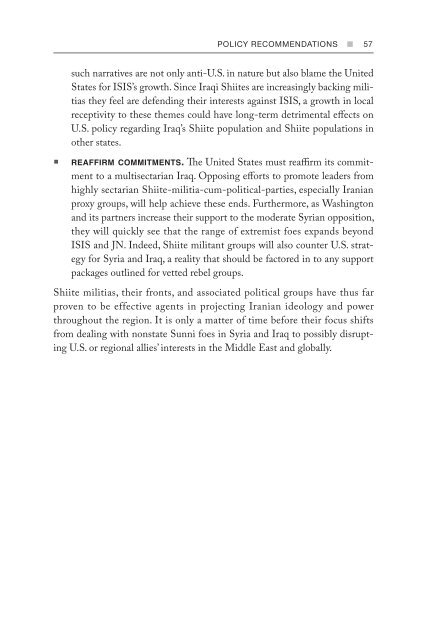You also want an ePaper? Increase the reach of your titles
YUMPU automatically turns print PDFs into web optimized ePapers that Google loves.
POLICY RECOMMENDATIONS n 57<br />
such narratives are not only anti-U.S. in nature but also blame the United<br />
States for ISIS’s growth. Since Iraqi Shiites are increasingly backing militias<br />
they feel are defending their interests against ISIS, a growth in local<br />
receptivity to these themes could have long-term detrimental effects on<br />
U.S. policy regarding Iraq’s Shiite population and Shiite populations in<br />
other states.<br />
• reaffirm commitments. The United States must reaffirm its commitment<br />
to a multisectarian Iraq. Opposing efforts to promote leaders from<br />
highly sectarian Shiite-militia-cum-political-parties, especially Iranian<br />
proxy groups, will help achieve these ends. Furthermore, as Washington<br />
and its partners increase their support to the moderate Syrian opposition,<br />
they will quickly see that the range of extremist foes expands beyond<br />
ISIS and JN. Indeed, Shiite militant groups will also counter U.S. strategy<br />
for Syria and Iraq, a reality that should be factored in to any support<br />
packages outlined for vetted rebel groups.<br />
Shiite militias, their fronts, and associated political groups have thus far<br />
proven to be effective agents in projecting Iranian ideology and power<br />
throughout the region. It is only a matter of time before their focus shifts<br />
from dealing with nonstate Sunni foes in Syria and Iraq to possibly disrupting<br />
U.S. or regional allies’ interests in the Middle East and globally.


